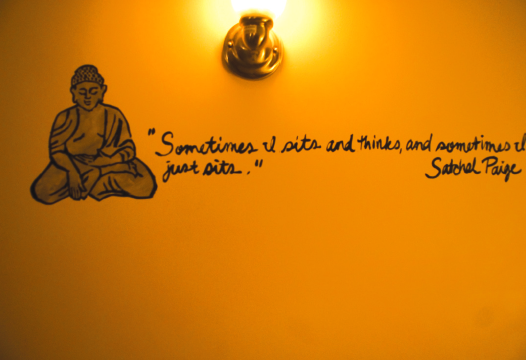“Boycott ego—not as a villain or an enemy—but don’t give it any fuel. Let ego have an energy crisis.” A talk by a meditation master.How to be happier, kinder, healthier, more successful, more open, less stuck, less stressed, less angry, less confused? Simple. Practice being present:
Buddhadharma: Why Meditate? ~ by Chögyam Trungpa, Rinpoche
Chögyam Trungpa was the “crazy wisdom” meditation teacher credited with transmitting Buddhism to America in wholly accessible, modern terms. Here, he looks at the ecology of meditation, and how simplicity can help to cut through the incessant chatter of mind that separates us from life. He gave these remarks during the first seminar at Naropa Institute, to an audience of 1,500 spiritual seekers who came to Boulder, Colorado, in the summer of 1974. ~ Carolyn Gimian.
~
Meditation helps to simplify your life.
It is the act of surrendering while sitting on your meditation cushion.
Then, by relating directly with your breath, body and mind, you have no problems communicating with yourself. You don’t have any goal or project in mind.
Lord Buddha recommended this 2,500 years ago, and since then millions of people have practiced in this way. Their meditative experiences and knowledge have been handed down, and each generation has added new richness to this training process.
Meditation is where the energy and enlightenment of the Buddhist lineage could meet together with our willingness to surrender the ego. It is highly possible.
When we begin to practice and to learn more, we may think we should be adding tricks or embellishments of all kinds to our practice. This is the approach of spiritual materialism. It seems fascinating and efficient to use more gadgets to run our domestic scene, office scene, spiritual scene or whatever scenes we may have. American society already has enough gadgets—but we want more.
In the long run, that approach is wasteful and creates further chaos. Spiritual discipline is not about advancement, but it is a question of undoing what we have created already. We are not talking about extending ourselves to become greater or more professional meditators, we are talking about meditation as unlearning.
We should be aware that spiritual materialism creates garbage. Some of the mental tricks associated with spirituality are so fantastic and outlandish that one wonders who dreamed up such things. One might feel dwarfed by such seemingly impressive wisdom. We purchase this stuff. We pile up one cardboard box of spiritual stuff after another. We bring it home and take it out of the cardboard box it came in, and then we find that our garage is completely filled with boxes after boxes with labels on them. A lot of these complicated techniques are just garbage that is being imposed on us. They have nothing to do with unlearning, undoing, or simplifying at all.
We have all made these kinds of collections. In fact, without them, we couldn’t come to the spiritual path. Some people like to collect junk, some like to collect antiques, some like to collect stamps. You have your own style of collecting. Some of these collections may be worthwhile. In the practice of meditation, you are surrendering the collections you have made, and that process could be genuine and beautiful. On the other hand, sometimes we are aggressive about holding onto our collections—we want to get something out of them.
In the practice of meditation, it is necessary to think quite sanely and practically about ecology. It is more ecological, needless to say, to stop collecting more stuff, more garbage. It would be terrible to collect too many things, more than we can handle. That would be like cutting too many order forms out of catalogs. It may seem simple and harmless, but after you mail it in, what comes back to you are huge boxes destined for the garbage.
The basic practice of meditation is a question of simplicity. The technique for the practice of meditation that was prescribed by the Buddha is working with the awareness of breath. That tends to cut through the unnecessary chatter of thought. The approach is so simple-minded that subconscious gossip and mind’s duplicity begin to decrease. Just be with your breath; just be with your body. Sit down and don’t try to think of anything else. Just sit and be with your breath. Let the breath be your thought.
When you take this almost simpleton approach, all kinds of metaphysical, philosophical and seemingly mystical experiences may descend on you in the form of your thoughts during meditation. So what? Just let them be. Just regard them as garbage—but not in the sense of looking down on them as bad, threatening and impure. Just see these collections of thought as something unnecessary. That is the starting point for the practice of meditation, which is the beginning of undoing ego’s territory.
Ego continually tries to create and maintain its security through the constant chatter of thought, our constant thought process. That process keeps itself busy, and it allows you to regenerate yourself constantly. Your mind’s motor keeps running because you have been pouring the fuel of conceptual mind into it for a long time. If you don’t pour more fuel in, if you don’t go along with the thought process, ego is starved. It is no longer sustainable. That seems to be the starting point, the basic attitude to begin the practice of meditation.
Boycott ego-not as a villain or an enemy-but don’t give it any fuel. Let ego have an energy crisis.
That is the basic approach that Buddha developed, and it is still up-to-date.
~
Adapted from “Meditation and Surrender,” Talk Five of The Tibetan Buddhist Path, Naropa University, Summer 1974 by permission of Lady Diana J. Mukpo, selected by Carolyn Gimian. Carolyn Gimian is editor of The Collected Works of Chögyam Trungpa. For a quote-of-the-week via email: [email protected]. To take a secular weekend meditation workshop: shambhala.org. Send feedback and suggestions for future columns: [email protected]


 Share on bsky
Share on bsky





Read 12 comments and reply